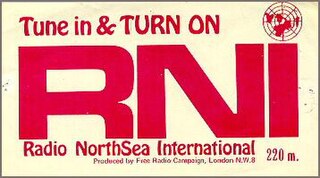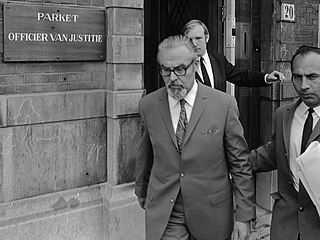
Scheveningen is one of the eight districts of The Hague, Netherlands, as well as a subdistrict (wijk) of that city. Scheveningen is a modern seaside resort with a long, sandy beach, an esplanade, a pier, and a lighthouse. The beach is popular for water sports such as windsurfing and kiteboarding. The harbour is used for both fishing and tourism.

A pirate radio station is a radio station that broadcasts without a valid license.

Offshore radio is radio broadcasting from ships or fixed maritime structures. Offshore broadcasters are usually unlicensed but transmissions are legal in international waters. This is in contrast to unlicensed broadcasting on land or within a nation's territorial waters, which is usually unlawful.

The Marine, &c., Broadcasting (Offences) Act 1967, shortened to Marine Broadcasting Offences Act or Marine Offences Act, became law in the United Kingdom at midnight on Monday 14 August 1967. It was subsequently amended by the Wireless Telegraphy Act 2006 and the Broadcasting Act 1990. Its purpose was to extend the powers of the Wireless Telegraphy Act 1949, beyond the territorial land area and territorial waters of the UK to cover airspace and external bodies of water.
Pirate radio exists in most countries in Europe.
Radio Newyork International was the name of a pirate radio station which broadcast from a ship anchored in international waters off Long Beach, New York, United States in 1987 and 1988. The history of Radio Newyork International (RNI) is linked with the Falling Star Network and other New York City area pirate radio stations. The owner of RNI, Allan Weiner, is currently the licensee of WBCQ shortwave in Monticello, Maine.

Radio Veronica was an offshore radio station that began broadcasting in 1960, and was on air for over fourteen years. It was set up by independent radio, TV and household electrical retailers in the Netherlands, to stimulate the sales of radio receivers by providing an alternative to the Netherlands state-licensed stations in Hilversum.

Edwin Bollier and his partner, Erwin Meister, founded Mebo Telecommunications AG in Zürich, Switzerland in 1969.
Radio Caroline is a British radio station founded in 1964 by Ronan O'Rahilly and Alan Crawford, initially to circumvent the record companies' control of popular music broadcasting in the United Kingdom and the BBC's radio broadcasting monopoly. Unlicensed by any government for most of its early life, it was a pirate radio station that never became illegal as such due to operating outside any national jurisdiction, although after the Marine, &c., Broadcasting (Offences) Act 1967 it became illegal for a British subject to associate with it.

Radio North Sea International was a European offshore radio station run by the Swiss firm Mebo Telecommunications, jointly owned by Swiss engineer Edwin Bollier and his business partner, Erwin Meister. RNI broadcast for less than five years in the early 1970s and, courting both disaster and success, made a modest financial profit.
Radio Delmare was a project by enthusiasts in 1977 to restore a Dutch radio ship, about three years after Veronica and RNI went off air. In May 1977 they bought MV "Aegir" and made it ready.
Erwin Meister is a Swiss businessman who, with his partner Edwin Bollier, formed the company Mebo Telecommunications in 1969. They bought a Norwegian freighter, renamed it Mebo II, and converted it into an offshore radio station.
Mebo Telecommunications AG is owned by Swiss businessmen Erwin Meister and Edwin Bollier.

Hendrik "Bull" Verweij was one of the founders of the Dutch offshore radio station Radio Veronica, and was president of the station from its founding in 1959 until 1975. He was born in Hilversum. After Veronica was forced to stop, one of the DJs of the station, Rob Out, formed the Veronica Omroep Organisatie: a legal entity that grew from a candidate broadcasting organisation to the largest broadcaster in the country.
This is a list of events in British radio during 1970.

Mi Amigo was originally a three-masted cargo schooner, that later gained international recognition as an offshore radio station. She was built as the schooner Margarethe for German owners. A sale in 1927 saw her renamed Olga and she was lengthened in 1936. During the Second World War, she was requisitioned by the Kriegsmarine and served as an auxiliary ship between 1941 and 1943. In 1953, the ship was again lengthened to 133 feet 9 inches (40.77 m). In 1959, she was sold for conversion to a floating radio station and was renamed Bon Jour. Subsequently, she was renamed Magda Maria in 1961 and Mi Amigo in 1962. She served, intermittently, as a radio ship, until 1980, when she sank in a gale.

Voice of Free Libya is the name used by three radio stations aligned to the anti-Gaddafi forces that began broadcasting in February 2011, operating from the cities of Benghazi, Bayda and Misrata. They played an important role in the Libyan Civil War and have continued to broadcast after the fall of Gaddafi.

MV Norderney was from November, 1964 until 31 August 1974 the transmission ship for offshore radio station Radio Veronica.
Albert J. Beirens was a Belgian radio producer and journalist.










